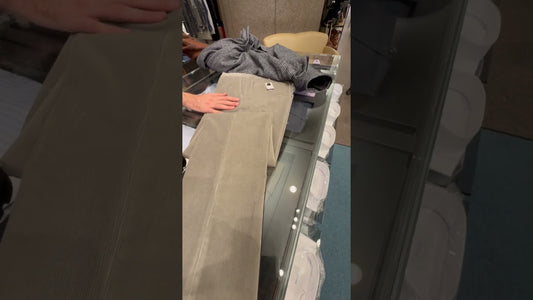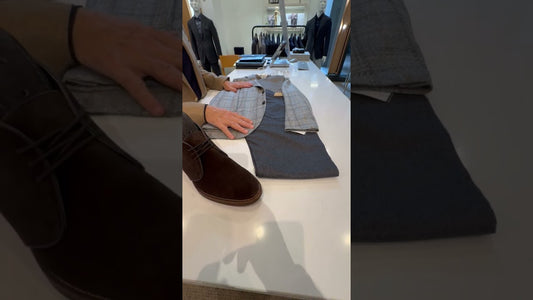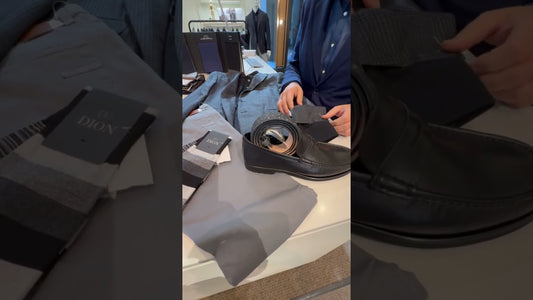A decade or so ago, “performance fabric” meant that an enterprising menswear manufacturer added stretch to enhance comfort, perhaps Teflon to boost stain resistance, or a quick chemical dip to protect against wrinkling. Flash forward to today.
The modern man lives a speed-of-light lifestyle, complicated by climate change, confounded by cranky, cramped business travel. Yet his suits must carry him from day into evening with stylish aplomb. Fortunately, research and development has spurred impressive innovation in even the most traditional luxury fabrics, delivering elegant tailored clothing that performs like its casual brethren. But all that flex and fortitude can’t trump the single, immutable reality: suits and tailored sportswear must still possess covetable curb appeal. This is why made to measure clothing persists – customers want custom menswear tailored uniquely to them and meant to make them shine.
“Customers care first about the look of the fabric— performance is the ‘cherry on top,’” says Arnold Brant.
Silverstone, president and chief creative officer of Samuelsohn/Hickey Freeman, one of the earliest (and most successful) adopters of luxury performance tailoring.
In 2011, Samuelsohn partnered with Loro Piana, one of Italy’s premier fabric mills, to introduce a proprietary fabric called Extreme, and more recently with Colombo to launch a revolutionary luxurious fabric called Ice Wool, which is subjected to repeated thermic shock during the manufacturing process. This naturally seals the fibers, resulting in greater resilience, a far more supple texture and enhanced color clarity. Ice Wool helps maintain an optimal body microclimate and offers exceptional water and stain resistance, all while maintaining the luxurious feeling of super-fine 150s wool.
Ermenegildo Zegna offers its super-fine (and aptly named) “High Performance” fabric in a collection of suits and jackets, all of which are defined by high-twist yarns that render the cloth exceptionally resistant to creasing and create a satisfyingly springy-yet-soft hand and a remarkably lightweight character: notably comfortable, packable and ideal for travel.
Canali, too, offers a mashup of luxury and innovation.
“Performance fabrics are more and more important in our collection, in both clothing and sportswear. We have believed in the attributes of performance for some time, and it is even more relevant today,” explains Giorgio Canali, director of Americas. The Canali collection features a pure cashmere field jacket, distinguished by a “wave” effect achieved through the synthesis of two traditional techniques. The first is “carding,” where the cloth is brushed using natural thistles, creating the visual “wave.” Then, hot metal cylinders are used to press the cloth, and finally the fabric is submerged in a hot fixing bath, which sets the pattern. The undulating result is visually compelling, with a hand reminiscent of fine sable fur.
The ascendance of performance tailoring has not gone unnoticed by purveyors of some of the world’s finest fabrics. Dougal Munro, president of Holland & Sherry, which has supplied tailors and luxury brands with cloth since 1836, notes that the firm hasn’t hesitated to enter into this game: “We offer a range of fine cottons with 2% Elastane, which results in 8% to 10% of physical stretch for an elevated level of comfort. Beyond that, our AquArret wool is water repellent and offers superior stain protection through a process that employs micro encapsulated nano-particles rather than Teflon; it remains viable for about eight cleanings.” You can request any of these fabrics through Larrimor’s should you choose the made to measure route. Remember that custom clothing and custom menswear can take any shape and is literally meant to fulfill the unique desires of the customer.
Dress shirts may have been the Founding Fathers of the performance fabric movement, offering wash-and-wear or no-iron options as far back as the 1950s, but the days of stiff polyester and toxic formaldehyde are a dim memory. Eton’s North American sales director, Chris Donohue, believes that quality is the key. “We employ more quality control people than design team members,” he shares.
That rigor, in tandem with the company’s commitment to the exclusive use of extra-long staple cotton, informs its approach to innovation. ELS, characterized by extra-fine and long fibers that result in durable yarns and elegant shirt fabrics, constitutes only 3% of the world’s cotton, yet accounts for 100% of the fabric used by Eton. The brand also employs a “textile genius” who joined the in-house team three years ago from the venerable fabric mill Gruppo Albini. Although the company does not tout “no iron,” Donohue is justifiably proud of the proprietary process that “changed the molecular structure to create a smoother, flatter, more wrinkle-free surface of cloth.”

And in a global culture where “green” is not just the color of money, all the companies we spoke to assert that the objective is to leave an invisible ecological footprint in their wake. It’s an ethos probably summarized best by Eton: “For us, high quality equals sustainability… the first step to a more sustainable clothing industry is to promote durable and timeless products.”
We’ll leave the last word to Silverstone, who rather adroitly sums up the prevailing sentiment: “If you can do luxury, and have it perform, what could be better?”











